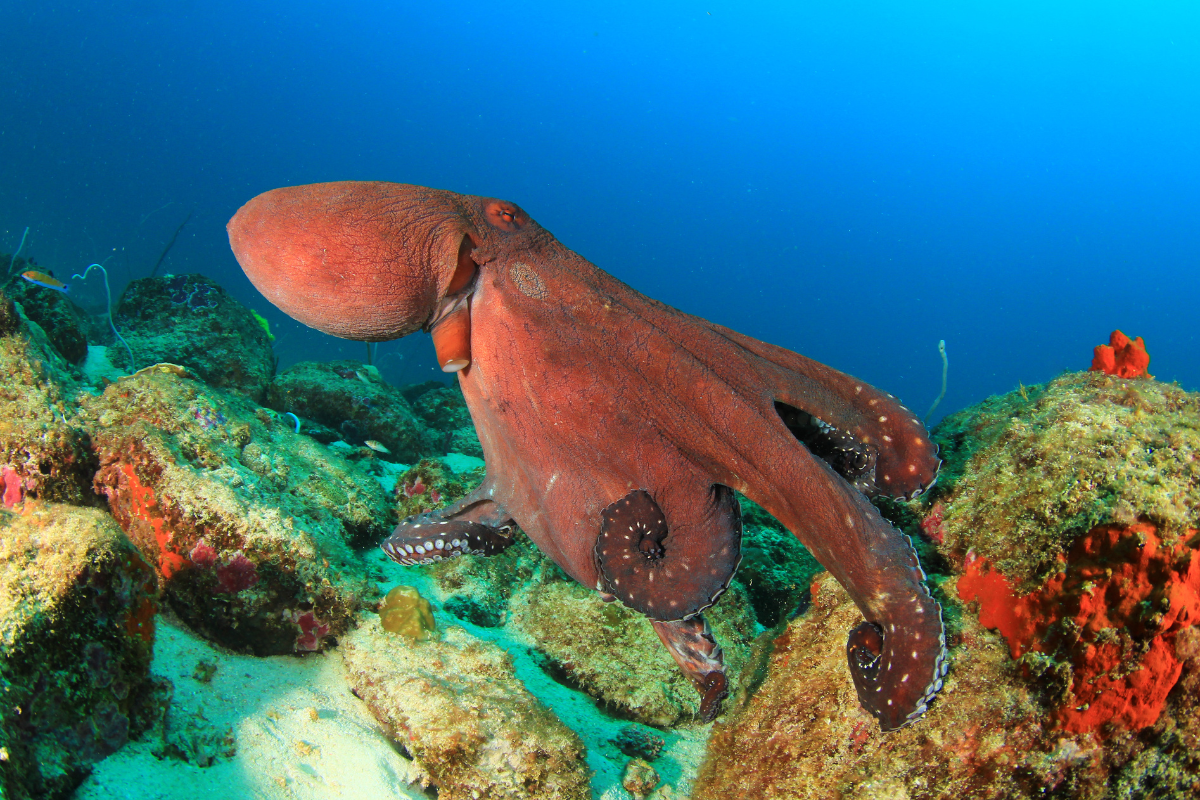By Scott Smith
Public outrage is growing over a Spanish company’s scheme to raise octopus on a massive scale in the Canary Islands only to slaughter them for the sake of a trendy menu item.
The Nueva Pescanova conglomerate is seeking local approval to push ahead with its plans to build a 567,000-square-foot facility along a dock in Las Palmas, where it will turn 1 million octopus a year into meat for humans to consume.
“Anyone who has seen the documentary film, ‘My Octopus Teacher,’ knows the animal is more fascinating and intelligent than the people who eat them,” says Priscilla Feral, president of Friends of Animals. “We don’t care whether someone wants to order an octopus salad in Greece, tapas in Spain, grilled octopus in Detroit, or at a raw bar in Japan. It’s not culture. It’s grotesque.”
Nueva Pescanova aims to produce 3,000 tons of octopus each year and is already selectively breeding the common octopus, or Octopus vulgaris, to raise for slaughter. Growing octopus to marketable size would take one to two years and require at least three pounds of wild-caught fish to produce one pound of farmed octopus. Opponents of the unsustainable project also warn of the potential release of massive amounts of pollution from the crowded tanks used to confine the octopuses.
The sentience of cephalopods
Whether you’re a scientific researcher or casual snorkeler, it’s readily apparent and easy to marvel at the curiosity, intelligence and sentience exhibited by octopuses. There are some 300 species worldwide, living everywhere from shallow reefs to deep ocean abysses. Octopuses have a complex nervous system and excellent sight and are considered the most behaviorally diverse of all invertebrates. They often lead solitary lives and are usually territorial.
“We thought we’d seen everything in terms of obscene “farming” practices, but to imprison octopuses in tanks and then proceed to kill them by dumping them in freezing water is beyond the pale,” says FoA’s Feral. “This barbaric project, and others like it, will be stopped when consumers stop eating them.”
Friends of Animals has campaigned to end the killing and exploitation of marine wildlife for decades. In the 1980s, FoA was instrumental in getting landmark legislation passed to protect
porpoises from being decimated by tuna fishing fleets. Just this year we finally achieved protections for the endangered queen conch after the National Oceanic and Atmospheric Administration agreed to list the queen conch as threatened under the Endangered Species Act. Last year we helped pass a total ban on the killing of horseshoe crabs in Connecticut waters and are currently seeking more protections for the critically endangered North Atlantic right whale. And we are continuing to challenge a permit, granted by the Environmental Protection Agency, that would allow the first deep-water fish farm to be constructed in federal waters, potentially wreaking environmental havoc in the Gulf of Mexico.
The only known octopus farm in the U.S., Kanaloa Octopus Farm in Hawaii, was permanently shut down in January, reports Species Unite. “Operating under the guise of a tourist attraction and a research facility for the production of cephalopods, an exposé revealed its intent to harvest octopus for ‘ink for food products, ornamental trade and meat for local restaurants.’” In late February, Washington State legislators passed a bill that would ban octopus farming in the state. The octopus farming ban awaits Gov. Jay Inslee’s signature. Once signed into law, Washington State will become the first in the world to ban the practice. California and Hawaii have introduced similar bills to prohibit the farming and sale of certain species of octopus before it becomes established, adds Species Unite.
“Octopus farming leads to suffering and sickness for one of the more intelligent and feeling animals in our oceans,” said Washington State Representative Strom Peterson, one of the bill’s sponsors. “It can lead to huge environmental and ecological effects as well. Octopus farming is harmful to the animals and the environment and is unnecessary.”
We couldn’t agree more.

